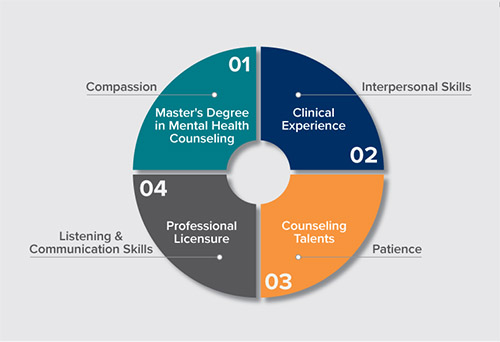Our dedication to Racial Equality and Social Justice (RESJ) spans decades. Learn more about our RESJ Initiative
What Do Mental Health Counselors Do?
What is mental health counseling? What do counselors do? Professional mental health counselors provide in-demand clinical support to patients in need of counseling help. Typically, counselors focus their efforts in several ways:
- People served, including based on age or life stage, gender, behavioral disorders, etc.
- Workplace setting, such as residential or outpatient care centers
- Counseling provided, for example, individual, couples / families, or group counseling
- Therapies used, including talk therapy, cognitive therapy, holistic therapies, etc.
- Employer, including being in private practice or working for nonprofit organizations; federal, state, or local government agencies; for-profit counseling or treatment providers (such as addiction recovery centers)
Step-by-Step Guide: How to Become a Mental Health Counselor
Some people come to the counseling profession because they’ve always known it is the right career. Others make a career change or add to their existing careers.
Let’s start from the beginning so that you can see how to get from here to there in your own life and career. Here’s a step-by-step guide on how to become a mental health counselor.
Step 1 – Apply to an Accredited Graduate Degree Program
When talking about the mental health of patients, quality academics matter. In fact, they matter a lot. Be sure that any counseling degree programs considered are accredited and reputable. Also take a close look at the value provided for your tuition dollars.
Cambridge College is accredited by the New England Commission of Higher Education (NECHE). The master’s in mental health counseling can be completed in two years or at your own pace, depending on the demands of your current work and family schedule. Cambridge College tuition is lower and more affordable than similar degrees.
Learn more about the types of counseling degrees available.
Step 2 – Graduate With a Master’s in Mental Health Counseling
The process of earning your counseling degree represents much more than tallying up credits and getting your diploma. Choose a mental health counselor degree program that provides a curriculum that helps you build yourself into a proficient clinician with both the theoretical and practical knowledge to help patients. Pay attention to optional degree concentrations that help you hone specific skills in your areas of clinical mental health counseling interest.
Cambridge College lets you choose from concentrations in addiction, rehabilitation, or trauma counseling.
Access full counseling degree program details now.
Step 3 – Pass the Licensed Mental Health Counselor Exam
Licensed Mental Health Counselors (LMHC) qualify for that critical professional credential by first graduating with a master’s in mental health counseling, completing the required clinical experience hours, and then passing the licensing exam.
Cambridge College provides the required academic and clinical experience to be eligible to sit for the LMHC exam through its master’s in counseling degree program.
Step 4 – Choose Your Mental Health Counseling Career Path
Mental health counselors have access to growing and diverse career opportunities for the patients they will see, where they will work, and what kinds of clinical mental health counseling work they will do.
Often Cambridge College master’s in mental health counseling students pursue promotions from their current employer, if they are already working in human services or the field of mental health. Others who are new to the field or looking to make a change have many options for employment.
Read this! Mental health counselor jobs in Boston and Massachusetts
Step 5 – Start Helping People as a Mental Health Counselor
Licensed Mental Health Counselor (LMHC) professionals bring their personal strengths, academic background, and clinical experience into their encounters with patients from all walks of life.

Responsibilities often listed on mental health counselor job description include the following:
- Evaluate new patients at intake to assess their mental and behavioral health status
- Create and explain treatment goals and plans with individuals and their families, as needed
- Coach patients through the clinical mental health counseling treatment process and skills needed to improve their mental health
- Help identify obstacles to success
Refer to other resources as necessary based on professional licensure scope of practice.
Take the First Step Toward Your Mental Health Counseling Goals
Cambridge College offers an accredited and affordable master’s in mental health counseling that includes the clinical experience hours required to sit for the Licensed Mental Health Counselor (LMHC) exam. Connect with a member of the admissions team to get started toward your goal of becoming a professional mental health counselor.


